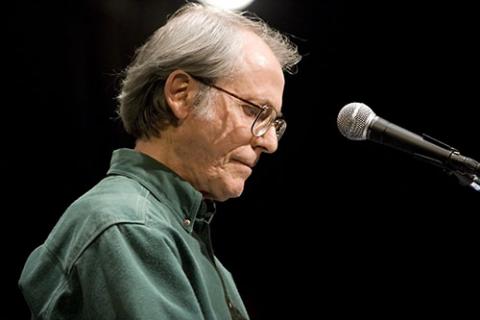The sense of an ending

America, September 2006.
An aspiring filmmaker drives into the middle of a desert 'somewhere south of nowhere' in search of a reclusive academic. The filmmaker, Jim Finlay, has arranged a meeting with his quarry, Richard Elster, to discuss the idea of a documentary about his time as an advisor to the US government. Elster, a brilliant but enigmatic intellectual, is believed to have been asked by the Pentagon to provide a new theoretical framework for the war in Iraq but the exact nature of his work has never been disclosed. Now Finley wants Elster to reveal on camera what transpired at his secret meetings and explain how he tried to alter the course of history.
Finley locates Elster's home, a spartan farmhouse miles from the nearest road surrounded by featureless plains and enclosed by high mountains. He only expects to stay a few days, the time it will take him to obtain Elster's commitment. However, the naivety of this assumption rapidly dawns on Finley. Elster has not only become a physical outcast living in an arid wilderness, he has also withdrawn into the shadowy thought-corridors of his own huge intellect. He is a man consumed with doubt about many things, among them what he was trying to achieve by working for the US government.
Gradually a strange routine develops. Elster asks questions. Finley provides answers. Elster cooks. Finley pours drinks. They sit for long, silent hours on a deck at the side of the house watching dusk settle over the vast nothingness. Finley comes to realize that a mutual dependence exists between them: he needs Elster to be the subject of his film, Elster needs him, but why? Is Finley here as a sounding-board for Elster's latest speculations; did he bring him here to keep him from committing suicide, or is Elster simply lonely? Finley has scarcely begun to appreciate the dynamics of their relationship when it is fundamentally changed by the arrival of Elster's daughter, Jessie.
Twentysomething, fragile and quite beautiful, Jessie is an unearthly presence. A word-child, she is extremely intelligent and yet sometimes unable to make the most elementary connections between names and their referents, between the mind's inner world and concrete reality. For Elster she is all that gives him happiness and a sense of continued significance. For Finley she is a curiosity whose overwhelming attractiveness he quickly succumbs to. A world away from the cage of trivialities that made up his old life, Finley soon forgets about the film and returning to New York and adjusts to life in the Elster household. Then a tragedy occurs which causes this delicate unit to implode and forces Elster and Finley's attentions back to earth for the most terrible of reasons.
Don DeLillo's work is many things but it is never simple. Whether a gigantic epic, like 1999's 800 page career-highlight Underworld, or one his numerous shorter books, DeLillo's novels are intimidating, unapologetically heavyweight fiction. Of the elder statesmen of American literature he is the most serious not only for his themes but for the complex, elliptical way he deals with them. The feverish, ever-changing dreamscape of contemporary US has been DeLillo's playground for forty years and he has chronicled the paranoia and uncertainty that led to the disintegration of the American Dream. A true post-modernist, he draws on a massive hoard of knowledge and his books are challenging patchworks of history, science, art and popular culture. DeLillo is also one of the most technically adept of novelists whose quicksilver prose glimmers before your eyes and is never less than sinister.
At just over 100 pages Point Omega, DeLillo's sixteenth book, is more novella than novel but it certainly does not lack substance. If anything, it contains enough questions for a whole raft of ordinary novels. It's also an exceptionally elusive novel. At different stages it looks like it's going to be about the Iraq war, ideological conflict, intelligence failure and the impossibility of maintaining traditional values. Behind these mirages lie DeLillo's real concerns: time and extinction.
Elster has tried to fashion the shape of things to come but this has proven futile because he has overestimated the power of ideas. Living in the desert out of reach of 'mortal time' he has become convinced of the importance of understanding the cosmic time that 'precedes and survives us.' He has also come to believe that the human race is 'all played out.' We are witnessing point omega, 'the last billionth of a second in the evolution of matter.' Subatomic particles have become hearts and minds but the burden of consciousness has proven too great and we are now driven by a subliminal desire 'to close it all down.'
What undermines Point Omega is Elster, less a fully rounded-character than a string of pretentious proclamations. It's hard to feel anything for him and the rest of DeLillo's cast are not much better. In fact, the book runs dangerously close to being more of a philosophical treatise than a novel and it's a mark of DeLillo's skill that he rescues it with an impressive and poignant final section. Those familiar with DeLillo shall enjoy the return of some of his hallmark interests (the relativity of experience, the impact of technology on human relationships, the impossibility of capturing the historical moment) while this short book is an ideal starting point for those new to him. There is always an unadulterated pleasure in reading work of this quality, and DeLillo's capacity to produce perfectly calibrated sentences has clearly not left him.
Point Omega is a reminder that he is one of the only novelists brave enough to say that there are more important things than the war on terror and the other conflicts that mark our age. He is a writer who remains determined to make his readers look beyond the immediate and contemplate human existence from some radically alternative, and troubling angles.
Point Omega by Don DeLillo
Picador
117 pages
